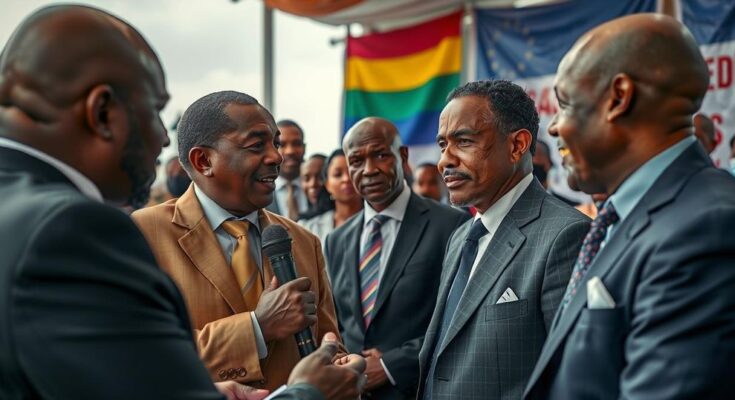Namibia is undergoing its most competitive elections since gaining independence 34 years ago, as Netumbo Nandi-Ndaitwah of Swapo competes to be the first female president against IPC’s Panduleni Itula. Voter turnout appears strong amid persistent socio-economic challenges faced by the nation. This election is seen as a crucial moment for the future of Namibia’s democracy and governance.
Voting is currently taking place in Namibia, marking what is anticipated to be the most competitive election since the nation’s independence from South Africa 34 years ago. Netumbo Nandi-Ndaitwah, representing the ruling South West Africa’s People’s Organisation (Swapo), is vying to become the country’s first female president. She seeks to succeed Hage Geingob, who passed away in February following a nine-year presidency.
Challenges such as high unemployment rates, poverty, inequality, and allegations of corruption have significantly undermined support for the ruling party. Nandi-Ndaitwah faces stern competition from Panduleni Itula of the Independent Patriots for Change (IPC) and an additional fourteen candidates. As voting commenced at 07:00 local time, reports indicated long queues at polling places across the nation, indicating a robust civic engagement among the electorate.
Since gaining independence in 1990, Swapo has maintained power, thereby making this election crucial. A candidate must secure over 50% of the votes to achieve an outright victory; if no candidate meets this threshold, a run-off will occur between the two leading candidates. Nandi-Ndaitwah cast her ballot in the capital, Windhoek, encouraging fellow citizens to participate, as the outcome will significantly affect their lives for the next five years.
Confronting a traditional and male-dominated political landscape in Namibia, Nandi-Ndaitwah draws on her extensive experience in government over the past twenty-five years. Itula, previously a dentist and lawyer, garnered 29% of the votes in the last election of 2019, a race won by Geingob with 56%. He underscored the significance of this election day for Namibia’s democracy while casting his vote.
Currently, Namibia is under the leadership of interim President Nangolo Mbumba, who assumed office after Geingob’s death but is not a candidate in the ongoing election. Analysts emphasize that the decisions made at the polls may heavily rely on young voters, who comprise over half of the electorate. In addition to selecting a president, Namibians are also electing new members of parliament in this critical democratic process.
The elections in Namibia, held against a backdrop of socio-economic challenges and political upheavals, represent a significant moment in the nation’s democratic journey. Since obtaining independence from a colonial regime, Namibians have faced persistent issues such as unemployment, poverty, and systemic corruption. The country has been governed by Swapo since its liberation struggle, making this election particularly noteworthy as it not only determines the successor to the late President Geingob but also tests the party’s long-standing dominance against emerging political entities like the IPC. Additionally, the ramifications of this election extend beyond presidential accountability to the composition of parliament, making it essential for shaping Namibia’s future governance. The growing influence of younger voters highlights a shift towards renewed political engagement and potential change in leadership.
In summary, the ongoing elections in Namibia are set to be a pivotal point in the country’s history, marking the potential end of a long-standing political era under Swapo. Candidate Netumbo Nandi-Ndaitwah aims to position herself as a transformative leader in a competitive field that includes significant opposition from Panduleni Itula and others. With crucial factors such as economic challenges and the influence of young voters at play, the upcoming electoral outcomes will undoubtedly shape Namibia’s political landscape and governance for the next several years.
Original Source: www.bbc.com




